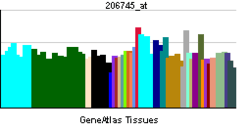HOXC11
| View/Edit Human | View/Edit Mouse |
Homeobox protein Hox-C11 is a protein that in humans is encoded by the HOXC11 gene.[3][4][5]
This gene belongs to the homeobox family of genes. The homeobox genes encode a highly conserved family of transcription factors that play an important role in morphogenesis in all multicellular organisms. Mammals possess four similar homeobox gene clusters, HOXA, HOXB, HOXC and HOXD, which are located on different chromosomes and consist of 9 to 11 genes arranged in tandem. This gene is one of several homeobox HOXC genes located in a cluster on chromosome 12. The product of this gene binds to a promoter element of the lactase-phlorizin hydrolase. It also may play a role in early intestinal development. An alternatively spliced variant encoding a shorter isoform has been described but its full-length nature has not been determined.[5]
References
- ↑ "Human PubMed Reference:".
- ↑ "Mouse PubMed Reference:".
- ↑ McAlpine PJ, Shows TB (Aug 1990). "Nomenclature for human homeobox genes". Genomics. 7 (3): 460. doi:10.1016/0888-7543(90)90186-X. PMID 1973146.
- ↑ Scott MP (Dec 1992). "Vertebrate homeobox gene nomenclature". Cell. 71 (4): 551–553. doi:10.1016/0092-8674(92)90588-4. PMID 1358459.
- 1 2 "Entrez Gene: HOXC11 homeobox C11".
Further reading
- Acampora D, D'Esposito M, Faiella A, et al. (1990). "The human HOX gene family". Nucleic Acids Res. 17 (24): 10385–10402. doi:10.1093/nar/17.24.10385. PMC 335308
 . PMID 2574852.
. PMID 2574852. - Rabin M, Ferguson-Smith A, Hart CP, Ruddle FH (1987). "Cognate homeo-box loci mapped on homologous human and mouse chromosomes". Proc. Natl. Acad. Sci. U.S.A. 83 (23): 9104–9108. doi:10.1073/pnas.83.23.9104. PMC 387083
 . PMID 2878432.
. PMID 2878432. - Apiou F, Flagiello D, Cillo C, et al. (1996). "Fine mapping of human HOX gene clusters". Cytogenet. Cell Genet. 73 (1–2): 114–115. doi:10.1159/000134320. PMID 8646877.
- Flagiello D, Gibaud A, Dutrillaux B, et al. (1997). "Distinct patterns of all-trans retinoic acid dependent expression of HOXB and HOXC homeogenes in human embryonal and small-cell lung carcinoma cell lines". FEBS Lett. 415 (3): 263–267. doi:10.1016/S0014-5793(97)01118-6. PMID 9357979.
- Mitchelmore C, Troelsen JT, Sjöström H, Norén O (1998). "The HOXC11 homeodomain protein interacts with the lactase-phlorizin hydrolase promoter and stimulates HNF1alpha-dependent transcription". J. Biol. Chem. 273 (21): 13297–13306. doi:10.1074/jbc.273.21.13297. PMID 9582375.
- Kosaki K, Kosaki R, Suzuki T, et al. (2002). "Complete mutation analysis panel of the 39 human HOX genes". Teratology. 65 (2): 50–62. doi:10.1002/tera.10009. PMID 11857506.
- Strausberg RL, Feingold EA, Grouse LH, et al. (2003). "Generation and initial analysis of more than 15,000 full-length human and mouse cDNA sequences". Proc. Natl. Acad. Sci. U.S.A. 99 (26): 16899–16903. doi:10.1073/pnas.242603899. PMC 139241
 . PMID 12477932.
. PMID 12477932. - Gerhard DS, Wagner L, Feingold EA, et al. (2004). "The status, quality, and expansion of the NIH full-length cDNA project: the Mammalian Gene Collection (MGC)". Genome Res. 14 (10B): 2121–2127. doi:10.1101/gr.2596504. PMC 528928
 . PMID 15489334.
. PMID 15489334. - Zhang X, Hamada J, Nishimoto A, et al. (2007). "HOXC6 and HOXC11 increase transcription of S100beta gene in BrdU-induced in vitro differentiation of GOTO neuroblastoma cells into Schwannian cells". J. Cell. Mol. Med. 11 (2): 299–306. doi:10.1111/j.1582-4934.2007.00020.x. PMID 17488478.
External links
- HOXC11 protein, human at the US National Library of Medicine Medical Subject Headings (MeSH)
This article incorporates text from the United States National Library of Medicine, which is in the public domain.
